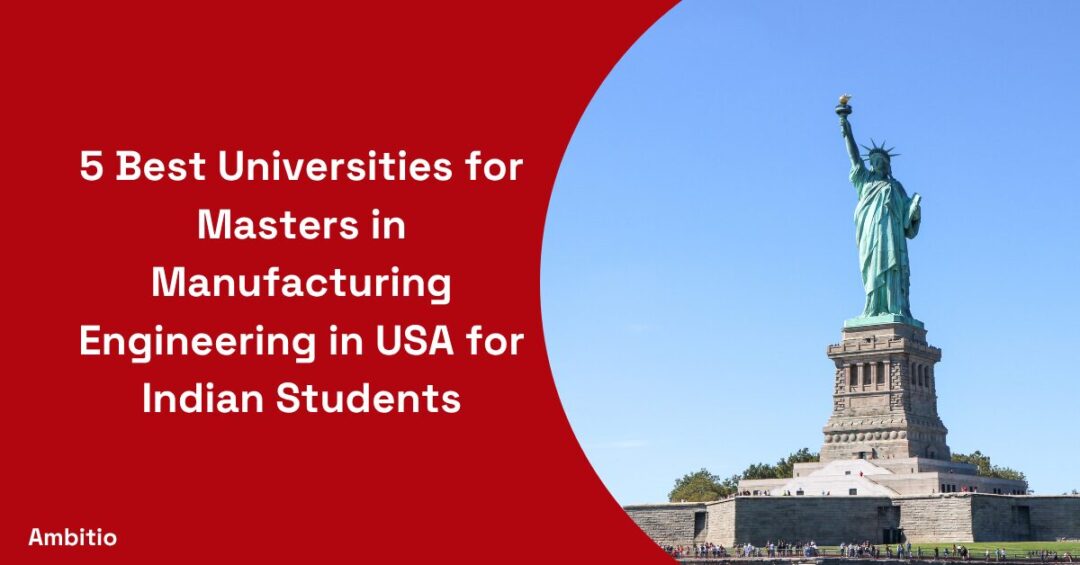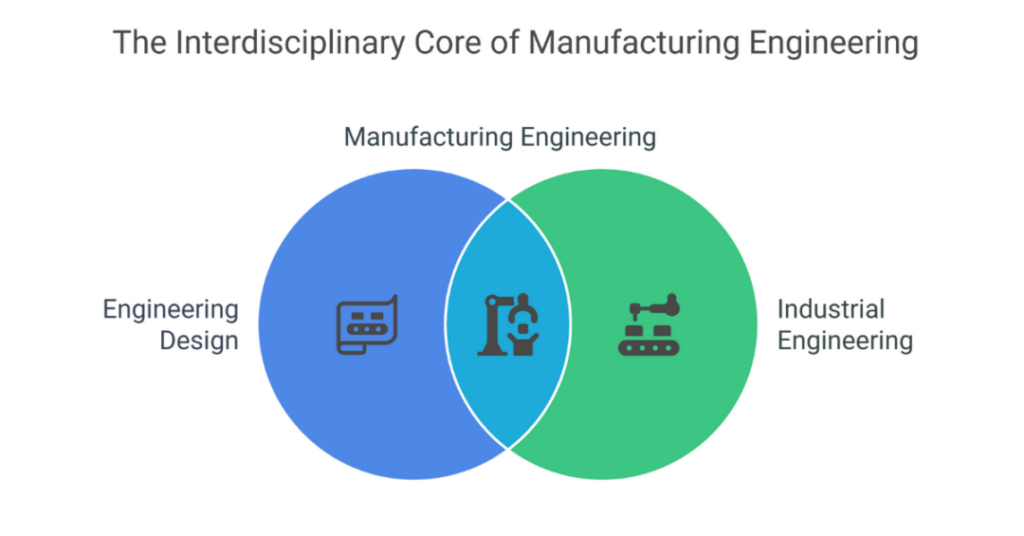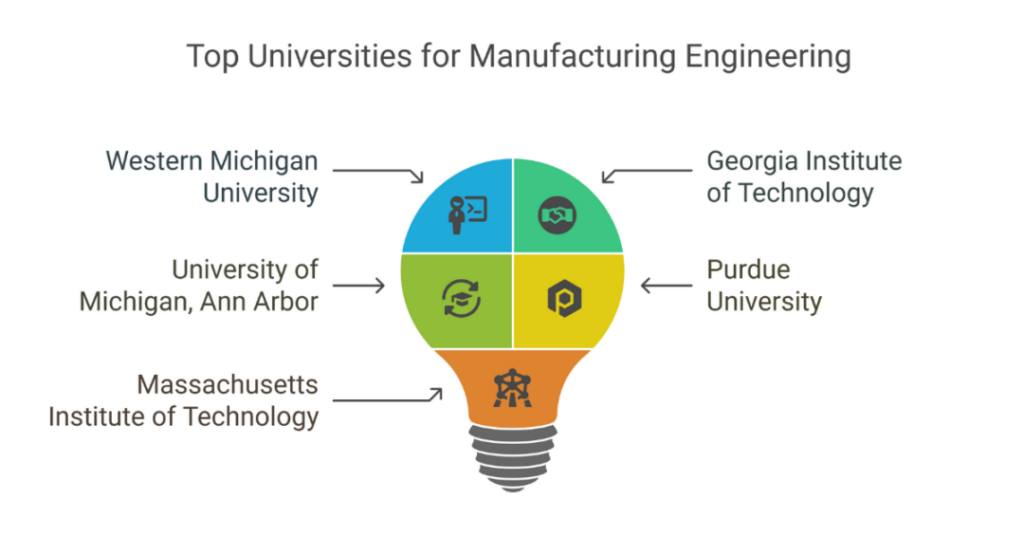9 June 2025
5 minutes read
5 Best Universities for Masters in Manufacturing Engineering in USA for Indian Students

Key Takeaways
- Masters in manufacturing engineering in USA empowers students with advanced skills in automation and product design.
- Masters in manufacturing engineering in USA opens doors to top universities and industry-integrated programs.
- Masters in manufacturing engineering in USA leads to careers in robotics, quality control, and operations management.
For Indian students interested in transforming their passion for engineering into fruitful global careers, an American Masters in Manufacturing Engineering is the ideal launching pad.
With its advanced research centers, high-end systems, and collaborations with global manufacturers, the US academic and professional climate is ready.
The students take an advanced degree in manufacturing engineering or cross it with mechanical or industrial engineering to gain a balanced edge.
The program not only improves the technical component but also builds skills in digital manufacturing, engineering design, supply chain management, and automation.
With the abundance of universities offering a master of science in manufacturing and manufacturing engineering course paths, it is no longer difficult to find a best fit based on interest and professional objectives.
From quality control to robotics, the degree opens up high-paying careers across various industries, including the automotive and aerospace industries and intelligent factories.
Students who have an MS in manufacturing engineering in USA also gain access to high-demand job positions and industry connections that make it easier to transition from graduate student to operations manager, design engineer, or quality manager.
What is MS in Manufacturing Engineering in USA?
Did you know that modern manufacturing contributes over $2.3 trillion to the U.S. economy every year?

That’s a good enough reason to consider an MS in manufacturing engineering in USA.
- It focuses on the design and development of efficient manufacturing processes and manufacturing systems.
- Combines theoretical coursework with hands-on training in digital manufacturing, automation, and product design.
- Students learn to manufacture products sustainably and with greater precision using computer-aided design (CAD).
- The degree in manufacturing engineering also draws upon elements from engineering design, industrial engineering, and project management.
- Graduates can work in roles such as quality managers, operations managers, or engineering managers across manufacturing enterprises.
How to Pursue Master of Science in Manufacturing Engineering and Mechanical Engineering in Top Universities of the USA?
Here’s a fun fact: Some universities in the USA allow students to blend mechanical and manufacturing engineering into a unique interdisciplinary track!
If you’re aiming for top universities in the USA, follow these essential steps:
- Complete an undergraduate degree in mechanical engineering, industrial design, or a closely related field.
- Gain prior experience or internships in engineering, robotics, or design and development projects.
- Prepare for and clear entrance exams like GRE, TOEFL, or IELTS, as required.
- Craft compelling application materials, including a resume, letter of recommendation, personal statement, and statement of purpose.
- Choose a degree program offering a manufacturing engineering specialization or electives in automation and robotics, engineering economics, and ergonomics.
Sample Admission Requirements Table:
| Requirement | Description | Importance |
|---|---|---|
| Undergraduate Degree | Bachelor’s degree in related field | Mandatory |
| GRE/GMAT | Standardized test scores | Highly Required |
| TOEFL/IELTS | English language proficiency tests | Mandatory |
| Resume & LORs | Shows professional experience and potential | Highly Required |
| SOP & Personal Statement | Reflects goals, motivation, and skills | Crucial |
Top Manufacturing Engineering Universities in the USA for International Students
Here’s something interesting: Some of the best universities in the U.S. have research centers exclusively for sustainable manufacturing and automation engineering!
1. Western Michigan University
Western Michigan University leads in providing practical, application-focused training in manufacturing engineering.
- Offers a specialized MS in manufacturing engineering program with an emphasis on advanced manufacturing systems.
- Strong focus on automation, quality control, and engineering management.
- Affordable tuition fees and high acceptance rate make it ideal for international students.
2. Georgia Institute of Technology
A pioneer in engineering education, Georgia Tech remains a top choice for engineering courses.
- Offers master of science in manufacturing and industrial engineering with flexible electives.
- Strong industry collaboration provides real-world research and development experience.
- Known for robotics, digital manufacturing, and engineering design.
3. University of Michigan, Ann Arbor
Ranked among the top universities in the USA, UMich combines tradition with innovation.
- Offers a rigorous MS in Manufacturing and a separate program in mechanical engineering.
- Includes aspects of integrated automation and robotics in its coursework.
- Home to world-class facilities like the Center for Sustainable Systems.
4. Purdue University
Famous for its legacy in engineering and aeronautical research.
- Provides a robust MS manufacturing engineering pathway through mechanical and industrial engineering departments.
- Coursework includes product design and development, supply chain management, and operations research.
- High job placement rate in manufacturing industry and government agencies.
5. Massachusetts Institute of Technology (MIT)
MIT is synonymous with innovation and advanced research.
- Offers graduate program in systems and engineering economics.
- Access to cutting-edge labs focused on design and build, automation and robotics.
- Graduates often lead in high-demand roles in modern manufacturing.
Documents Required for an Advanced Manufacturing Engineering Program
Here’s a cool stat: Most students complete their application in under 3 weeks if their documents are ready in advance!
Key documents needed for admission into a manufacturing engineering course:
- Undergraduate transcripts showing relevant coursework in mechanical engineering or industrial engineering.
- IELTS or TOEFL scores as proof of language proficiency.
- GRE or GMAT test scores depending on university requirements.
- Resume highlighting technical skills, professional experience, and internships.
- Statement of purpose and personal statement clearly detailing career goals.
- Letter of recommendation from academic or industry professionals.
Document Importance Table:
| Document | Relevance | Importance |
| Transcripts | Prove academic qualifications | Essential |
| IELTS/TOEFL | Language proficiency | Mandatory |
| GRE/GMAT | Standardized testing | Depends on Univ. |
| Resume | Shows professional experience & technical skills | Crucial |
| SOP & Personal Statement | Career motivation and fit for the program | Very Important |
| LOR | Validates applicant’s academic/professional merit | Highly Required |
Do Robotics, Automation and Manufacturing Systems Come Under the Manufacturing Engineering Course?
Fun fact: Robotics, automation, and systems often appear as core subjects or electives in many MS in manufacturing engineering degrees.
Robotics:
- Focus on the design and development of intelligent machines.
- Involves integration with manufacturing processes and quality management.
- Applications include industrial automation and smart manufacturing enterprises.
- Often uses tools like CAD, simulation software, and real-time controls.
- Key to enhancing production efficiency and innovation.
Automation:
- Streamlines manufacturing processes using software and control systems.
- Reduces human error and increases consistency.
- Integral to sustainable manufacturing and operations management.
- Combines knowledge and the skills from computer science and mechanical engineering.
- Vital for future-proofing manufacturing industry roles.
Manufacturing Systems:
- Represents a holistic view of how different engineering management functions come together.
- Emphasizes integration of design, production, and logistics.
- Covers supply chain management, information systems, and quality control.
- Essential for operations managers and quality managers.
- Encompasses engineering is one comprehensive framework.

Comparative Table:
| Topic | Core Focus | Applications | Industry Use |
| Robotics | Intelligent machines | Manufacturing & assembly lines | Automotive, electronics, food factory |
| Automation | Streamlined control systems | Product design and development | Smart factories, digital manufacturing |
| Systems | Integrated manufacturing processes | Operations research, supply chains | Government agencies, manufacturing firms |
Conclusion
A Masters in Manufacturing Engineering in the USA is more than just a degree; it’s a gateway to innovation and leadership in modern manufacturing.
With top manufacturing engineering universities like Western Michigan University, Purdue, and MIT offering robust coursework and research opportunities, international students can explore diverse career opportunities.
Whether you focus on robotics, automation, or integrated systems, this graduate program equips you with the technical skills and problem-solving mindset needed in the 2024 job market.
If you like to study emerging technologies and build a career in manufacturing enterprises, this degree program is a perfect match. Make your move with Ambitio and start shaping the future of manufacturing today.
FAQs
What is the eligibility for masters in manufacturing engineering in USA?
To apply for a masters in manufacturing engineering in USA, students typically need a bachelor’s degree in engineering or a related field, along with GRE and English proficiency scores like TOEFL or IELTS.
How long does a masters in manufacturing engineering in USA take to complete?
A typical masters in manufacturing engineering in USA takes about 18 to 24 months to complete, depending on the university and specialization track.
Is work experience required for masters in manufacturing engineering in USA?
While not mandatory, prior work experience can strengthen your application for a masters in manufacturing engineering in USA, especially for competitive programs.
What are the top universities offering masters in manufacturing engineering in USA?
Top universities offering masters in manufacturing engineering in USA include MIT, Purdue, University of Michigan, Georgia Tech, and Western Michigan University.
What is the average tuition fee for masters in manufacturing engineering in USA?
The average tuition fee for masters in manufacturing engineering in USA ranges from $20,000 to $60,000 per year, depending on the institution.
Does a masters in manufacturing engineering in USA include robotics and automation?
Yes, a masters in manufacturing engineering in USA often includes electives or core modules in robotics, automation, and digital manufacturing.
What career options are available after completing masters in manufacturing engineering in USA?
Graduates of masters in manufacturing engineering in USA can pursue careers as quality managers, production engineers, automation specialists, or operations managers in global industries.

You can study at top universities worldwide!
Get expert tips and tricks to get into top universities with a free expert session.
Book Your Free 30-Minute Session Now! Book a call now




























